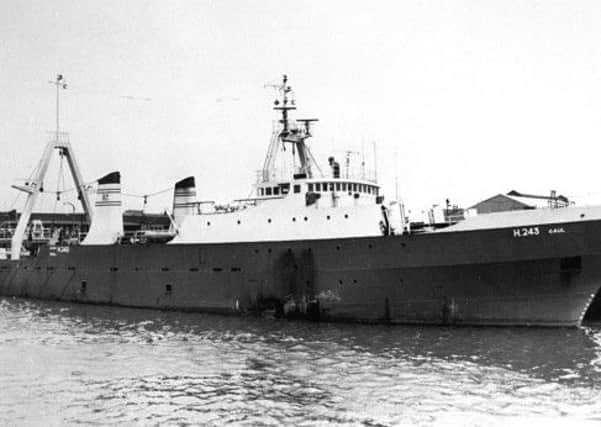Remains found in Russia ‘not of crew from Hull supertrawler’


After a year of waiting the Russian authorities have said DNA testing on remains, found buried in a cave on the Rybachy peninsula in the Murmansk region, were most likely to belong to the Northern Russian or Finno-Ugric population.
But Hull West and Hessle MP Alan Johnson said: “This can’t be the end of the line”.
Advertisement
Hide AdAdvertisement
Hide AdHe added: “I’m writing to the Foreign Office and want the Foreign Secretary’s views on this and want to know more about what testing took place and why suddenly they don’t need British expertise when they have needed it up till now.”
The remains were placed under rocks after being washed up in 1974 or 1975.
The Gaul sank off the Norwegian coast in a storm in February 1974, with the loss of all 36 crew.
The remains’ existence came to light in 2012 and last December relatives in Hull were asked to give DNA samples to help identify them, only to discover this weekend they have not been used.
Advertisement
Hide AdAdvertisement
Hide AdAndy Atkinson, who was 10 when he lost his father Raymond, a deckhand on the Gaul, said: “There were two outcomes I was expecting, either it was my Dad, or it wasn’t. We weren’t expecting this at all.
“We were told in all probability they were British seamen and members of the Gaul because of the times they washed up and the knife and sheath they had on them. We were told the Russians didn’t have the technology to do the DNA.
“A year down the line they say they aren’t English. It just doesn’t add up.”
Mr Atkinson said not one relative he’d spoken to was satisfied with the outcome. He said: “The common feeling seems to be distrust.
Advertisement
Hide AdAdvertisement
Hide Ad“There are no answers, just questions. I’d like someone to go there and do the DNA – you can’t just accept what they say.”
Mr Johnson said: “It is inadequate to leave it at this stage. Every relative has had DNA taken. The least that has to happen is for it to be matched to the DNA of the remains that have been found. In addition we are concerned that the Russians themselves accepted they didn’t have sufficient expertise this time and almost 12 years ago. Therefore why suddenly do we accept this is the end of the road on the issue?”
Another relative, who didn’t wish to be named, said sending a team to Russia would give “peace of mind” but she had no expectation that it would help shed light on what happened to their loved ones. “This is going to go on for years. In a couple of years something else will come out. Maybe the truth will be out in 100 years,” she added.
It wasn’t until 1997 that a TV reporter, the late Norman Fenton, took the initiative to look for the Gaul. Finding her took a matter of hours: Her position was marked on local fishing charts
Advertisement
Hide AdAdvertisement
Hide AdThree sets of remains were found in 2002 following a robot dive. This triggered a second inquiry in 2004 – the first, in 1974, having concluded the Gaul “capsized and foundered due to being overwhelmed by a succession of heavy seas”.
Humberside Police had been hoping to send out three police officers and a scientist to evaluate the remains.
It said: “Clearly following this latest news from Russia there is no longer a necessity for officers to travel. Humberside Police remain willing to investigate any new information that comes to light in relation to Gaul, but at this time the news from Russia concludes our involvement in the matter.”
The Foreign Office said: “As a fellow member of Interpol, we have no reason to doubt the veracity of the Russian response.”